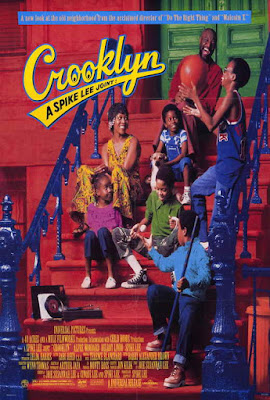Crooklyn
1994 family dramedy
Rating: 14/20
Plot: A family in Brooklyn. Wait, that's not a plot. Those are just the characters and the setting. I really should have my blog taken away from me after crap like this.
The last film from 1994 that I wanted to watch before making my list isn't one of Spike Lee's most well-regarded joints, but I liked its period details in these slices of this family's life, its vibrant style and colors, and the packed soundtrack. And it really does have a packed soundtrack, an amount of songs that might rival Forrest Gump and its double-disc soundtrack. Sure there might be a new song every two and a half minutes in this movie, but the R&B cuts slide in perfectly with the action on the screen.
This was written by Spike and a couple of his sisters, Joie and Cinque, and the love that the director has for this time period, this particular neighborhood, and these characters gushes from the screen. The opening is wonderfully nostalgic, a montage sweep through the neighborhood as the kids play various games that city kids would have played in that era while Marc Dorsey's "People Make the World Go Round" plays. It's a great introduction to this world, the kind that can make a middle-aged guy like me envious of the kids who get to live in it. Of course, that halcyon existence isn't the whole picture. Like all families, this one has its share of problems. By the time we meet the rest of the family and are introduced to those problems, however, the Lees do a good job of acclimating us to a world that at least this viewer doesn't have experience with.
Dad's rushed prayer, somnabulistic urination, glue-sniffin' drug trips, Connie and Tito's grocery store dancing, whisper-singing along with the Partridge Family, a fight over Trix, battles with neighbor Tony and his Coke bottle lens and keyboard stylings, sibling rivalry and sibling love. This movie works better when it focuses on the little slice-of-life moments or on the inconsequential than it does when it dives into drama. Spike Lee's direction is flashy, but it's in a sneaky way, not really drawing attention to itself as much as it draws the audience into the lives of these family members. For 2/3 of the film, the visuals and humor keep this burbling.
Once the family takes a trip to the country, Lee loses his way a little. The first issue is the way the scenes in the country are filmed. Lee obviously wants to give this new setting a different look, but the way he tries to accomplish that is just distracting. I had to look it up. Lee filmed those scenes in "widescreen without anamorphically adjusting the image," at least according to the IMdB trivia page. I don't really know enough about film to understand what that means, but essentially, the picture was stretched vertically so that the characters seemed a little squashed. It's meant to be disorienting, but I really thought it was a huge distraction.
By the time the entire family is back in Brooklyn, the drama's also elevated, and I just didn't think the drama worked as well as the humor here. I'm sure the Lees are telling the story as it actually happened. Folks who want spoilers can take a look at the biographical details of Spike Lee's life. The dramatic events covered here would be difficult, I imagine, for an artist to spend a lot of time with. Maybe that's why that part feels a little bit rushed to me. Or maybe that's part of the point. Maybe life's curve balls and tragedies come at you so fast, especially when you're a child who can't really understand much of the real world beyond your stoop, that you don't really have the time to let things sink in.
My favorite character was the white guy played by David Patrick Kelly. I refuse to think about what this might mean.
Subscribe to:
Post Comments (Atom)


No comments:
Post a Comment